
Rouge are a Brazilian pop girl group formed in 2002, through the talent show Popstars and signed a deal with Sony Music. The group was originally consisted of Aline Wirley, Fantine Thó, Karin Hils, Li Martins and Lu Andrade, until Luciana's departure from the group in 2004.

Blá Blá Blá is the third studio album released by Brazilian girl group Rouge on June 16, 2004 by Columbia Records. The album is the first of the group like quartet, marking the absence of member Luciana Andrade. In this work, the Rouge bet in a more aggressive and mature pop, being considered the preferred album among the members. Blá Blá Blá brings the four members of the group writing two songs in partnership with Milton Guedes and Rick Bonadio, and Fantine and Karin have written a song by themselves; the repertoire also brings Bonadio's original compositions, alone or together with Fúlvio Márcio, Clio, Beto Paciello and Guedes. The album features versions of three songs previously released by other artists, plus four songs composed in English and the group's record company, Sony Music, brought the group to record with exclusivity.
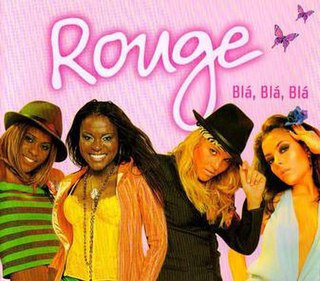
"Blá Blá Blá" is a song by the Brazilian girl group pop Rouge, released as the first single from the third studio album of the girls, also called Blá Blá Blá (2004). The song was written and produced by Rick Bonadio, and the first single by the girls without Luciana Andrade, who left the group in early 2004.

"Sem Você" is a song by the Brazilian girl group pop Rouge, released as the second single from the third studio album by the girls, Blá Blá Blá (2004). The song was written in Spanish by Andrés Constantinidis and Carolina de La Muela, with the title "No Dejo de Sentir", and was translated and produced by Rick Bonadio. The song is a ballad, which talks about not being able to live without the loved one.

C'est La Vie is the second studio album by Brazilian pop girl group Rouge, released in 6 May 2003. The album is the successor to the band's first album, Rouge (2002), which sold more than 2 million copies, having as main hit the song "Ragatanga". The album features zouk as the main style in the songs "Brilha La Luna" and "Vem Cair na Zueira", as well as international versions such as "Eu Quero Fugir" and "C'est La Vie".

Rouge is the debut album by Brazilian girl group pop Rouge, released on August 19, 2002 by Columbia Records in partnership with RGB. Recorded during the Popstars program and with the musical production of Rick Bonadio, who signs 9 of the 14 compositions, the album counts on compositions of Milton Guedes, Dudu Falcão, Piska, besides having nine versions of international songs and the participation of trio KLB in one of the tracks. The album mixes up-and-coming songs from pop and dance-pop with romantic ballads in songs that talk about fame, love, domination and the power of dreams.

"Não Dá pra Resistir" is a song by the Brazilian girl group Rouge, released as the debut single from the band's debut studio album, also titled Rouge (2002). Originally a song in English, titled "Irresistible", written by Kara DioGuardi, Frederik Thomander and Anders Wikstrom, was adapted in Portuguese by Milton Guedes and produced by Rick Bonadio. The original version of the song was later sung by Nikki Cleary and released on her self-titled album, a year after the adapted song released in Brazil.

"Brilha la Luna" is a song by the Brazilian girl group pop Rouge, released as the first single from the second studio album by girls, C'est La Vie (2003). The song was written and produced by Rick Bonadio, bringing the zouk as the dominant style of the song. "Brilha la Luna" has verses in Spanish, and in many cases, portunhol. The song only brings Luciana Andrade singing a solo, since the whole song is sung by all. After leaving the group, the verses sung by Luciana were sung by Karin Hils and Fantine Thó, respectively. Critics found the song similar to "Ragatanga" and predicted that it would achieve the same success as the song.
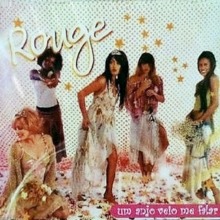
"Um Anjo Veio Me Falar" is a song by the Brazilian girl group pop Rouge, released as the second single from their second studio album, C'est La Vie (2003). "Um Anjo Veio Me Falar" is a version of the song "Angel in My Heart", written by Eliot Kennedy, Suzanne Shaw and Tim Woodcock and performed by the pop groups Hear'Say and Jump5. The Portuguese version was written by the members of Rouge, along with Rick Bonadio, who also produced the song. "Um Anjo Veio Me Falar" is a pop ballad that talks about the quest and expectation of a great love announced by an angel. The song was a hit on radio stations all over Brazil, helping the group gain nationwide renown, and becoming the second most famous song of the group and the ballad of greater recognition. The song won 2 awards: the "Capricho Award" and the "Troféu Universo Musical".

"Vem Cair na Zueira" is a song by the Brazilian girl group pop Rouge, released as the third single from the second studio album by the girls, C'est La Vie (2003). The song was written and produced by Rick Bonadio, and brings again the zouk and Latin elements in their sonority. The song talks about living in peace, having fun, without thinking of anything. In the middle of the song, Aline does a rap.
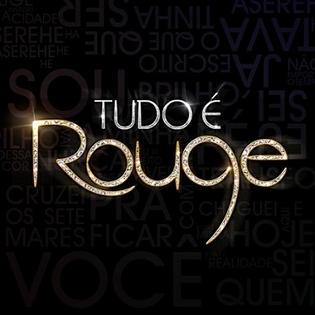
"Tudo é Rouge" is a song by the Brazilian girl group Rouge, released as a promotional single on April 15, 2013, the first release in 8 years. The song, composed by members of the group, along with Rick Bonadio, who also produced it, was the fruit of a meeting with the producer for his reality show Fábrica de Estrelas. "Tudo É Rouge" is a pop song, also deriving from dance-pop and EDM.
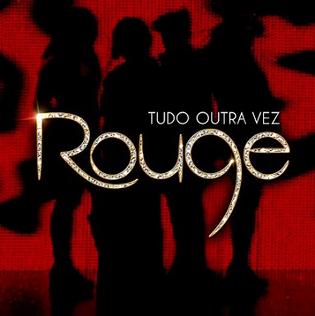
"Tudo Otra Vez" is a song by the Brazilian girl group Rouge, released as a promotional single on April 22, 2013. The song, composed by members of the group, Fantine Thó and Karin Hils, and produced by Rick Bonadio, was the result of a meeting with the producer for his reality show Fábrica de Estrelas, from which also was born "Tudo É Rouge".

Luciana Andrade, better known as Lu Andrade, is a Brazilian singer, songwriter, presenter and actress. In 2002 she won the talent show Popstars and joined the Brazilian girl group Rouge until 2004, recording two of the four studio albums, Rouge (2002), C'est La Vie (2003). In 2004 she left the band claiming lack of identification with the musical style of the group that sold 6 million copies in all and became the most successful girl group of Brazil and one of the twenty that more sold in the world.

Fantine Rodrigues Thó is a Brazilian singer, songwriter, dancer and instructor. In 2002, she won the talent show Popstars and joined the Brazilian girl group Rouge until 2005, with which she released four studio albums, Rouge (2002), C'est La Vie (2003), Blá Blá Blá (2004) and Mil e Uma Noites (2005), selling in all 6 million copies and becoming the most successful girl group of Brazil and one of the twenty that more sold in the world. In 2006 formed the progressive rock band Banda Thó with his brother Jonathan and some friends, which did not give continuity at the end of the following year, when married and moved to Netherlands.

Bailando is a song by the Brazilian girl group Rouge, released as the group's first return single on February 4, 2018, and is distributed by Sony Music. The song was recorded on the night of the 13th at dawn on November 14, 2017, and was composed and produced by Umberto Tavares and Jefferson Junior, with additions in the composition of the member Fantine Thó. "Bailando" is the first single from Rouge since 2005 and the first with its original line up since 2003.

Dusty But New is the debut album by Brazilian singer Fantine Thó, released on February 20, 2015.
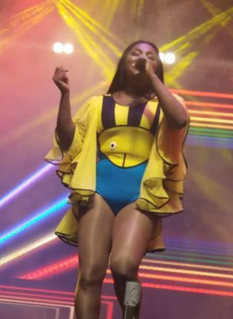
Karin Pereira de Souza is a Brazilian actress, singer and songwriter. In 2002, she won the talent show Popstars and joined the Brazilian girl group Rouge until 2005, with which she released four studio albums, Rouge (2002), C'est La Vie (2003), Blá Blá Blá (2004) and Mil e Uma Noites (2005), selling in all 6 million copies and becoming the most successful girl group of Brazil and one of the twenty that more sold in the world.

"Mind and Heart" is a song by Brazilian singer Lu Andrade. The track was released as the first official single from his solo career.

Aline Wirley da Silva Christóforo is a Brazilian actress, singer-songwriter. In 2002, she won the talent show Popstars and joined the Brazilian girl group Rouge until 2005, with which she released four studio albums, Rouge (2002), C'est La Vie (2003), Blá Blá Blá (2004) and Mil e Uma Noites (2005), selling in all 6 million copies and becoming the most successful girl group of Brazil and one of the twenty that more sold in the world.
"Dona da Minha Vida" is a song by the Brazilian girl group Rouge, released on August 31, 2018. The group is composed of Lissah Martins, Aline Wirley, Luciana Andrade, Fantine Rodrigues Thó and Karin Hilsby who are in partnership with Pedro Dash, Marcelinho Ferraz, Karen Rodriguez, Mr. Paradise, Lucas Nage, Pedro Tofani, Joey Mattos and singer Jão. Their focus is on R&B with trap music and soul elements inspired by urban singers such as Alicia Keys and Beyoncé. The theme of the song deals with feminist movements and ideologies and abusive relationships.




















